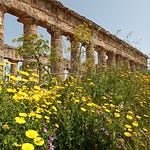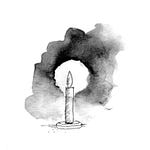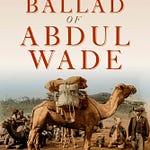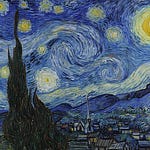In 1954, Australian writers Charmian Clift and George Johnston abandoned their comfortable careers as journalists and fled to the Greek Islands. The experience ultimately destroyed them, both as a couple and as individuals, but despite that, I can’t help but think that they might have been onto something.
I discovered the writings of Charmian Clift and her husband, George Johnston last year. I came to Clift through her second memoir, Peel Me a Lotus, which covers the years she and Johnston spent living on the Greek island of Hydra in the 1950s and 1960s. Johnston I came to through his novel, Clean Straw for Nothing. The novel is the second book in the Meredith trilogy, and Johnston’s observations on Australia and Australians are as insightful and valid today as when the book was first published in 1969. Clean Straw for Nothing, at its core is really about quitting your job and following your dreams, come what may. I wish that I had read it when I was twenty years old.
The book is set between 1945 and 1968, in the shadow of the horrors of World War II. The narrator, David Meredith, having seen the war up close working as a war correspondent, is searching for something more than what his day job as the London correspondent for an Australian newspaper can offer; Meredith wants to write about the nuclear build up in post war Europe and what it means for the world, instead, his editor requests “a Sunday story on who has the biggest tits – Lollobrigida or Diana Dors.”
The request sends Meredith into a crisis and his wife, Cressida, encourages him to get out of journalism. Meredith looks about his London home and asks “What about all this?...The flat? The car? The big salary, the expense account, the living allowance?”
“Well, what about them?” Cressida responds. But Meredith doesn’t answer, he just goes on listing all the things that tie him to a job that has lost all meaning for him. “The nice school for the kids? All these books? Your clothes? Mine? Holidays on the continent?”
Cressida replies, “But we don’t own these things, darling. They’re not ours. They own us, really, don’t they?”
We all have Lollobrigida moments at work, the moment that our employment becomes what Meredith describes as “meretricious muck”, but we always seem to look past it, do as Meredith does and justify why we must stay in the job. There are always good reasons to keep on turning up, momentary salves to rub on our longing for change, but they only ever alleviate the symptom and never cure the ill.
When my Lollobrigida moment hit, and I looked around me I had none of the material possessions that held Meredith in place. I had nothing that owned me because I owned nothing that could not fit into my small car. Nor have I ever bought anything that I cannot pay for in full, on the spot (Apart from tertiary education but that is another story).
My lack of material possessions seems to astound people. When I tell friends of my intention to have no fixed abode this year, their first question is inevitably, “What about your furniture?” Then as I tell them that I have none, their pupils dilate and a look of fear fills their eyes, as if they have suddenly realised they are in the presence of a mad man.
Material things tend to become decision points that prevent us from moving forward. We would like to move to a Greek island but what will we do with the leather sofa? The fridge? The washing machine? How will we make the payments on the car? The house? Create enough decision points and eventually they weigh us down, start to own us and once they own us, they will always be there to convince us that what we would like to do, what we know we should do, cannot be done.
Meredith eventually rejects all the logical reasons for him to persist with the conformity of his London job. At one point he says, “Everyone gets to the stage, or should get to it, where it’s more important to stop doing things then to keep on trying to do them.” Doing something new is easy, stopping, or breaking free of the old, is the hard part.
I remember my excitement when I finished Clean Straw for Nothing. Here suddenly I had a precedent, a path to be followed, literature that spoke to everything that I had been feeling. I told my wife about the book, about Charmian and George and their real-life escape to the Greek islands to pursue a creative life.
“And how did they end up?” she asked me.
“Well, life on the island ruined them financially, practically destroyed their marriage and when they finally returned to Australia they both struggled to adapt. Charmian committed suicide in 1969 and the following year George, who was riddled with tuberculosis, also died. But,” I continued, my enthusiasm undimmed, “they did get a lot of great writing done.”
“Mmm…” said my wife.
I may have bungled the pitch for the Greek Islands, but I did make it to the coast of Northern New South Wales. A solid first step.
There is no doubt there was a heavy cost to Clift and Johnston’s decision to drop out of their careers and abscond to Hydra. There were epic parties, daily drinking sessions and constant smoking, all of which accelerated Johnston’s health problems. Clift had several affairs that placed enormous strain on the marriage. They also felt excluded by colleagues and friends, resentful that Clift and Johnston had rejected the paths that they themselves had chosen. To these people it seemed that by throwing caution to the wind to pursue their writing dreams, Clift and Johnston were declaring themselves better than those who chose conformity. And the colleagues that didn’t resent the couple considered them failures, as having given up.
But there were also great rewards in their decision. Johnston writes of “transcendental moments too, magical experiences that cannot be entered into any ledger…the lessons we have learned of the true values of living, of the run of the seasons and the poetries of rock and water and rain and sun and light and fire.” Clift echoes these sentiments in Peel Me a Lotus, writing, “At least our way of life is of our own choosing. We even derive some peculiar satisfaction from our discomforts as we become more aware that we are learning again the true values of light and warmth and food and shelter, which for so many years we have taken for granted.”
In my previous post I referred to Hernan Cortes ordering his men to destroy the boats so that there could be no turning back. The end of that story is that after plundering the Aztec city of Tenochtitlan, most of Cortes’ men died. Weighed down by their plundered gold, they were easily captured and killed or otherwise drowned.
I see a parallel there with George and Charmian. They left the safety and security of stable jobs in London to pursue creative gold in Greece, knowing that once the decision had been made there would be no way back to their previous lives of comfortable conformity. On the island of Hydra, they realised their dreams, wrote their books, found their gold, and ultimately, this pursuit of something different, a life better lived, is what destroyed them.
I can only admire them for breaking free, living lives of their own choosing and blazing a path to be followed.
My Lollobrigida moment was watching exceptional colleagues forced to go through the uncertainty and stress of having to reapply for their own jobs. Have you had a Lollobrigida moment? What would it take for you to throw it all in and pursue your dreams? Leave your answers in the comments and the best one, as chosen by me, will receive a copy of Clean Straw for Nothing.
















